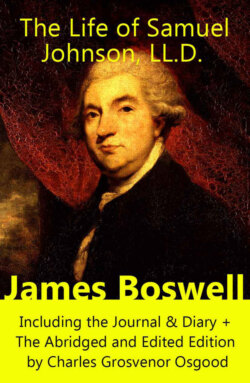Читать книгу The Life of Samuel Johnson, LL.D. - James Boswell - Страница 227
На сайте Литреса книга снята с продажи.
‘JAMES BOSWELL.’
ОглавлениеUpon his arrival in London in May, he surprized me one morning with a visit at my lodgings in Half-Moon-street[176], was quite satisfied with my explanation, and was in the kindest and most agreeable frame of mind. As he had objected to a part of one of his letters being published, I thought it right to take this opportunity of asking him explicitly whether it would be improper to publish his letters after his death. His answer was, ‘Nay, Sir, when I am dead, you may do as you will[177].’
He talked in his usual style with a rough contempt of popular liberty[178]. ‘They make a rout about universal liberty, without considering that all that is to be valued, or indeed can be enjoyed by individuals, is private liberty. Political liberty is good only so far as it produces private liberty. Now, Sir, there is the liberty of the press, which you know is a constant topick[179]. Suppose you and I and two hundred more were restrained from printing our thoughts: what then? What proportion would that restraint upon us bear to the private happiness of the nation[180]?’
This mode of representing the inconveniences of restraint as light and insignificant, was a kind of sophistry in which he delighted to indulge himself, in opposition to the extreme laxity for which it has been fashionable for too many to argue, when it is evident, upon reflection, that the very essence of government is restraint; and certain it is, that as government produces rational happiness, too much restraint is better than too little. But when restraint is unnecessary, and so close as to gall those who are subject to it, the people may and ought to remonstrate; and, if relief is not granted, to resist. Of this manly and spirited principle, no man was more convinced than Johnson himself[181].
About this time Dr. Kenrick[182] attacked him, through my sides, in a pamphlet, entitled An Epistle to James Boswell, Esq., occasioned by his having transmitted the moral Writings of Dr. Samuel Johnson to Pascal Paoli, General of the Corsicans[183]. I was at first inclined to answer this pamphlet; but Johnson, who knew that my doing so would only gratify Kenrick, by keeping alive what would soon die away of itself, would not suffer me to take any notice of it[184].
His sincere regard for Francis Barber, his faithful negro servant, made him so desirous of his further improvement, that he now placed him at a school at Bishop Stortford, in Hertfordshire. This humane attention does Johnson’s heart much honour. Out of many letters which Mr. Barber received from his master, he has preserved three, which he kindly gave me, and which I shall insert according to their dates.
‘To MR. FRANCIS BARBER.
